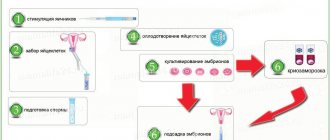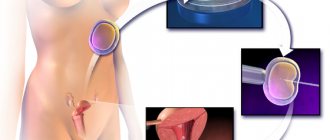Nowadays, pregnancy after 30 years is not uncommon. Many women postpone having children; often life circumstances do not allow them to have them earlier. Natural changes in tissue and insufficient blood circulation in the reproductive organs reduce the possibility of fertilization, so it is usually not possible to get pregnant right away. In our time, priorities have changed, age standards have shifted upward, and this trend has become firmly rooted in society.
Today, the level of medicine allows us to minimize the possible risks of complications. A woman planning to get pregnant later should closely monitor her health: visit a doctor regularly, get rid of bad habits, and moderate physical activity will also be useful.
Pregnancy after 30
Pregnancy at 30 and after
Pregnancy after 30 years - what are its characteristic differences, what should a woman who puts off conceiving and bearing a child until better times be wary of?
If previously women mostly gave birth before the age of 25, now they are trying to have children later. Pregnancy at 30 and after does not surprise anyone. Not every woman manages to quickly find her prince - the father of her unborn child. And whoever succeeds, difficulties arise on the material plane. There are very few wealthy young families in Russia. In older age, educated and purposeful people, as a rule, everything turns out well. There is a desire and opportunity to give birth and raise a worthy member of society.
However, the first pregnancy after 30 years of age still causes concern among many of our doctors. Until quite recently, women even younger than this age were called old-timers and many reasons were found for hospitalization and cesarean section. What are the features of pregnancy after 30 years, what are doctors afraid of?
We don't get any younger over the years. And health at 30 is still not as strong as at 20, in most cases. Although there are many thirty-year-old women who can give odds to twenty-year-olds. Much depends on genetic characteristics and lifestyle. If a woman has no chronic diseases since her youth, normal weight, good nutrition and an active lifestyle, preparation for pregnancy after 30 is the same as at 20. That is, a standard examination for sexually transmitted infections, blood and urine tests. If you have chronic diseases, it is advisable to visit specialists for consultation.
As women age, their fertility decreases and ovulation occurs less and less frequently. It can be especially difficult to get pregnant closer to 40 years of age, since the supply of eggs remains small. In addition, at this age, many women have already suffered from various gynecological diseases, which have caused inflammation in the fallopian tubes and the formation of adhesions in them. The older a woman is, the more likely she is to have an ectopic pregnancy.
And finally, “genetic damage”. Their likelihood increases slightly after 30 years, and many times after 35 years. Children with Down syndrome are more often born to women over 40 years of age. But this is not a reason to give up motherhood. It’s just that such women are especially carefully screened to identify possible malformations and diseases in the fetus. Often, the fetal genetic material is taken to analyze its chromosome set, which gives an almost 100% answer as to whether it is genetically healthy.
These are the main features of pregnancy in women over 30 years of age. If life turns out in such a way that childbirth occurs at an older age, it doesn’t matter. Find a competent doctor to manage your pregnancy, have a thorough examination, lead a healthy lifestyle, and everything will be fine.
Features of pregnancy at the age of 30+
Pregnant women over 35 or older have an increased risk of congenital genetic diseases and abnormalities in the fetus.
Including, the likelihood of having children with Down syndrome increases. Therefore, when caring for pregnant women aged 30+, significant attention is paid to diagnosing the genetic health of the fetus. In the first trimester, screening is carried out: ultrasound and biochemical markers are entered into a computer program and the likelihood of congenital anomalies in the child is calculated. The fetal karyotype will also be determined, invasive procedures (chorionic villus biopsy, amniocentesis, cordocentesis) and non-invasive methods (test without internal intervention) will be prescribed.
The invasive procedure is prescribed for women over 35 years of age, women at risk and with poor results of other studies. This is a big argument in favor of actively planning a pregnancy at 30-32 years old and not postponing it until 35 years.
During pregnancy, a woman needs to lead a quality and calm lifestyle. Continue to exercise, slightly reducing the load. Optimize nutrition - you can’t undereat or overeat, you need to eat little and often. Maintain water balance - drink 2.5-3 liters of water per day. Rest more, have good sleep.
Eliminate psycho-emotional stress and minimize stress factors. The latter should not be underestimated, since stress negatively affects a woman’s hormonal levels. But only in a healthy hormonal background is it possible to carry out a pregnancy normally. The constant impact of stress factors on the pregnant woman's body loads the adrenal glands, resulting in the release of stress hormones, which, in turn, lead to disruption of sex hormones and a number of other problems. Including impaired glucose tolerance and gestational diabetes. Therefore, take care of yourself!
How to get pregnant with your first child after 30
At this age, you can get pregnant within a few months. To be more likely to determine a favorable day for conception, there are simple methods described below.
Recommendations
- Know your menstrual cycle. Mark the first day of bleeding on your phone calendar; this is the starting point. The approximate days when the egg leaves the follicle are three days before and three days after the mid-cycle.
- Measure basal temperature. The thermometer should be at hand, since you cannot get out of bed before taking the measurement. It is placed in the anus for one minute. On the days of ovulation, the temperature rises to 37-37.5 degrees.
- Check the consistency of the mucus. During ovulation, it is less viscous and more liquid. You should stretch it between your thumb and index finger.
- Use pharmacy ovulation tests. The application technique is similar to pregnancy tests. The result becomes positive 24-48 hours before the egg is released.
Contraindications
Unfortunately, not all women are given the opportunity to experience motherhood through their own pregnancy and childbirth.
From a medical point of view, there are a number of undeniable contraindications to bearing a child. These include:
- severe pathologies of the cardiovascular system;
- persistently high blood pressure or hypertension;
- pyelonephritis of both kidneys, one kidney or their complete absence;
- severe form of bronchial asthma;
- diabetes;
- epilepsy;
- severe mental illness.
How to prepare for your first pregnancy as an adult?
Carrying a baby is work, both physical and spiritual. So, first of all, prepare your body (you can sign up for a gym, preferably swimming or yoga - such activities teach you to relax mentally too). Meditation can also help you.
The female doctor is your friend. Listen to him, undergo all possible examinations and tests. This will protect your future little one from possible genetic pathology.
These days, good clinics and laboratories charge hefty bills, and many people think: I’m healthy, why go there?
But don’t forget: during pregnancy, your body will be subject to a double or even triple load, and who knows how long this apparent health will last? So go through all the specialists and exclude:
- possible exacerbations of chronic diseases,
- STD,
- dental problems,
- “female-style” inflammation and other diseases of the most intimate organs.
Having seen the full picture of your tests, the doctor may advise you to treat something, or simply take vitamins.
Since all organs of the baby are formed in the first months of pregnancy, it is very important that your body is healthy at this time and does not experience a deficiency of vitamins and other useful elements. In addition, give up bad habits, instilling useful ones instead (the same sport without fanaticism). All this will help you easily carry your long-awaited baby and give birth yourself.
Get ready: you will be “guided” especially carefully throughout your pregnancy. The doctor will check to see if the baby has a congenital defect or developmental anomalies. From 16 to 20 weeks you will donate venous blood for “genetic pathologies”. If the doctor is concerned about something, he will ask you to take the test again.
Mothers “40+” undergo all the genetic tests that modern medicine knows - the percentage of defects in the fetus at this age is too high. In the 1st trimester, a chorionic villus biopsy is performed, and in the 2nd trimester, chordocentesis is performed.
Are there any benefits to late pregnancy?
If you are ready to tune in to the positive, then it is worth knowing not only about possible difficulties, but also, of course, about those small bonuses that a woman who decides to become a mother in adulthood can receive.
Despite the fact that pregnancy puts a significant burden on the body, changes in hormonal levels and physiological “shake-up” can become catalysts for the real process of rejuvenation. Women who decide to give birth after 35 can observe that the skin is noticeably tightened, the hair has become healthier, and problems with blood pressure have not worsened, but rather disappeared with the birth of the baby.
The birth of a child can become a kind of “brake” for the onset of menopause. After all, while the child is pregnant, the supply of eggs is “frozen.” In addition, according to the observations of specialists, the onset of menopause in women who gave birth late is much easier.
The psychological component should not be overlooked. Despite the fact that a woman’s body is ready to bear and give birth to a child at the age of 20, many women feel the psychological need to become a mother much later. And, perhaps, right now you can give your baby the necessary warmth and care that he so needs.
And there are much more opportunities after 30. A woman can choose a good doctor and maternity hospital, afford all the necessary medications and procedures.
By the way, additional tests are often prescribed to older women absolutely free of charge at the antenatal clinic at their place of residence, which significantly reduces the risk of “overlooking” the pathology of the development of the birth or course of pregnancy.
Point one: consultation with a gynecologist
The very first step from which any pregnancy planning begins, regardless of whether it takes place after 30 years of age or before reaching this age, is a visit to the gynecologist’s office. The expectant mother can make an appointment with a doctor at a antenatal clinic or private clinic. The gynecologist will make the first conclusions by examining the patient’s medical record, finding out everything about past pregnancies, past abortions or spontaneous miscarriages (if any). The gynecologist should also analyze the methods used by the future parents for contraception and conduct a colposcopy to exclude any pathologies affecting the cervix. If necessary, he will remove the uterine device and discuss with the woman the abolition of contraceptives.
Records of previous or chronic diseases will also be important information for the doctor, because the gynecologist must refer the woman for further examination, drawing up a list of necessary measures.
Typically, the first stage includes the following examinations:
- consultation with a general practitioner;
- passing various tests - general, for infections and hormones, etc.;
- ECG;
- necessary ultrasound examinations;
- visiting an endocrinologist (if indicated);
- consultations with narrow specialists (in the presence of chronic pathology);
- conversation with a geneticist (if at least one parent is over 35 years old, this is a mandatory procedure).
At the antenatal clinic, all examinations can be completed free of charge. In a private clinic, preparation for pregnancy will cost a considerable amount.
If there are indications, the man is referred to an andrologist and to have a spermogram to ensure his health and normal fertility, since male infertility today, just like female infertility, is quite common. Both spouses should donate blood to determine their blood type and Rh factor, so that the doctor is aware of the possibility of Rh conflict during pregnancy.
According to indications, the gynecologist may recommend that a woman take daily measurements of basal temperature by day of the cycle in order to identify any violations in advance and prescribe treatment. The basal temperature chart must be drawn up for at least 3 months.
Expectant mother at 30 weeks of pregnancy
Starting from the 30th week of pregnancy, a working woman is entitled to prenatal leave. There was a time when it was given later, but observations have shown that active work during this period, physical and mental overload can provoke premature birth. After all, the body is already experiencing enormous stress. The uterus is located so high that the diaphragm puts pressure on the heart, and it even changes its position in the chest - it “lies” as if across. Breathing also becomes difficult, resulting in slight shortness of breath.
At 29-32 weeks, the baby still needs a lot of nutrients, vitamins, and mineral salts. All this is supplied to him by his mother’s body. Therefore, vacation is best used for relaxation. Don’t waste your free days doing extra chores around the house, don’t start renovations or general cleaning, don’t get overwhelmed running around the shops. Although, of course, you don’t need to lie down all day either. For the sake of a successful pregnancy, you must move! If quiet walks in the fresh air have already become a habit for you, this is exactly what you need.
Many women are concerned about constipation, bloating - severe flatulence. Only a rational diet will help. You still don't need foods that cause gas - grapes, fresh cabbage, peas, other legumes, fresh milk, an abundance of soft white bread, rolls, and sweets.
But the baby will really like it if you eat 100-200 g of raw carrots with a grated apple and a spoonful of sour cream every day. Yogurt, fermented baked milk, and kefir are useful. Steamed dried fruits are good for normalizing intestinal function. But don't take laxatives. In the last trimester of pregnancy, they can provoke contractile activity of the uterus and cause premature birth.
Use a simple, proven tool. Take equal quantities of dried apricots, raisins, figs and prunes, wash thoroughly, dry, and then pass through a meat grinder. Place the mixture in a jar with a lid and place it in the refrigerator. Start your breakfast, lunch and dinner with a tablespoon of this mixture. You can drink it with water. Don’t expect any special effect for the first two days, but then everything will improve.
USEFUL INFORMATION: Anembryony
By the 32nd week of pregnancy, the baby usually assumes the position that will remain until birth. More often he lies head down, this is called a cephalic presentation. But if he turns his buttocks towards the cervix, this is a breech, or pelvic, presentation. Doctors classify it as a pathological syndrome, since it is difficult (and often impossible) for a child to be born without special obstetric care. But at this stage the fetus can still change its position.
To help your baby turn head down, perform special exercises for breech presentation.
When the baby turns head down (this is clearly visible on an ultrasound), you must immediately put on a bandage - purchase it in advance at the pharmacy. It will support the anterior abdominal wall and hold the fetus in the desired position.
Starting from the 30th week of pregnancy, expectant mothers are not recommended to sleep and rest lying on their backs to avoid the occurrence of inferior vena cava syndrome. This syndrome is caused by increased uterine pressure on the inferior vena cava (the inferior vena cava is located under the enlarging pregnant uterus) - the main collector through which venous blood rises from the lower extremities and lower body to the heart, and therefore the venous return of blood to the heart is reduced, There is a decrease in blood pressure (if it drops sharply, fainting occurs).
Inferior vena cava compression syndrome can manifest as anxiety, a feeling of shortness of breath, increased breathing, dizziness, darkening of the eyes, paleness, sweating, and tachycardia (increased heart rate). Most often, the syndrome occurs with polyhydramnios, pregnancy with a large fetus, with hypotension (low blood pressure), with multiple pregnancies, and also in pregnant women of short stature. No special treatment is usually required. If compression syndrome of the inferior vena cava occurs, it is enough to immediately turn on your side. You need to know that with pronounced long-term compression of the inferior vena cava, uterine and renal blood flow decreases, the baby is less well supplied with blood and nutrients. Complications such as premature placental abruption and varicose veins of the lower extremities, acute and chronic fetal hypoxia are possible.
While there is still a lot of time left before giving birth, you have the opportunity to carefully study the ratings of maternity hospitals and make a choice in favor of one or another maternity hospital. And in order to more clearly define the selection criteria for yourself, it is useful to first draw up a birth plan.
"29 weeks pregnant 31 weeks pregnant"
More on the topic Pregnancy at 38 years old - fear, surprise and joy
38 years old, daughter 12... Almost pregnant
And instead of joy and pleasure from the situation, I am tormented by endless black thoughts on all fronts. There are still a million fears about the pregnancy itself (there was anembryonics two years ago. I gave birth to my second daughter at almost 38 years old. The eldest was already 10.5 years old at that time.
Violence in family
Yesterday I came across news about the “Kamchatka chikatilo”, I became curious what kind of animal it was, I followed the links, read it... And I’m still in shock and bewilderment... How could a mother not notice that her new husband had been wrapping her in tape for 5 years and raped her teenage daughter in every way?! O_O And I don’t understand my stepfather... What’s the point of crap like that in your own house, taking risks and dodging, if in our times any sex can be found for free and with impunity at any time of the day?! :/ And the girl, in general...
age, excess weight, late pregnancy
My first pregnancy was at 24 years old and I gained 12kg. I realized a long time ago that only children bring me the greatest joy in life.











